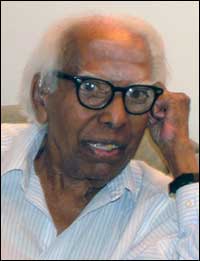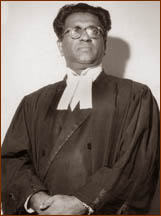V. Navaratnam's Last Interview
by TamilNet, December 22, 2006
|
"The U.S. Assistant Secretary of State Richard Boucher's recent reference to the responsibilities of the [Sri Lankan] Government was precisely the same as the substance of a speech I made in the Ceylon Parliament on 11th June 1968," noted the doyen of Tamil politics, V. Navaratnam, when he spoke to TamilNet on 02 November. "I am 97 years old and have lived through the makings of history - not global history with British troops marching into Belgium to start World War I, but more particularly the political, constitutional, judicial, cultural and social history of Ceylon, the country of my origin."
Mr. Navaratnam passed away in Canada Friday |
1972 Sri Lanka Constitution Illegal - Navaratnam
"The U.S. Assistant Secretary of State Richard Boucher's recent reference to the responsibilities of the [Sri Lankan] Government was precisely the same as the substance of a speech I made in the Ceylon Parliament on 11th June 1968," noted the doyen of Tamil politics, V. Navaratnam, when he spoke to TamilNet on 02 November. "I am 97 years old and have lived through the makings of history - not global history with British troops marching into Belgium to start World War I, but more particularly the political, constitutional, judicial, cultural and social history of Ceylon, the country of my origin."
Mr. Navaratnam passed away in Canada Friday.

V. Navaratnam
[18.10.1910 - 22.12.2006] |
"It was a lengthy speech [on 11th June 1968], frequently interrupted by the Prime Minister Dudley Senanayake, his deputy J.R.Jayawardene, and others including the president of the Federal Party, in which I traced the 50 year history of a series of negotiated pacts for the solution of the Singhalese-Tamil conflict, beginning from 1919, through the Mahendra Pact of 1925, the Bandaranaike - Chelvanayakam Pact of 1956 and the Dudley Senanayake - Chelvanayakam Pact of 1965," Mr. Navaratnam said.
"I am glad to find that the most powerful Donor among the Co-Chairs is well apprised of the dire situation that confronts the Tamils in Ceylon. A high ranking diplomat from the US State Department, Mr. Richard A. Boucher, Assistant Secretary of State for South and Central Asian Affairs, who was in Ceylon recently, addressed an audience in what appears to be a US-arranged press conference in Colombo," the doyen of Tamil politics said.
Mr. Richard A. Boucher was reported to have said: "We need to start with the basic fact that there is a democratically elected government here in Sri Lanka. A democratic government, as a member of comity of nations, is obliged politically and constitutionally, to respect and defend the human rights of its citizens. Therefore, the primary responsibility to respect and defend human rights is with the government.”
To a question by another correspondent he said: "I think there is more than that, though, that should lead the LTTE to negotiations. The fact is that the LTTE fights for the legitimate grievances of the Tamil community. The LTTE's goals are also to see the Tamil community is respected, and is able to control its own affairs within a unified island. The only way they are going to achieve those aspirations is through negotiations."
"These are views which are not usually associated with the United States before. Allowing for the propensity of governments to use worn-out clichés such as 'democratically elected governments', 'territorial integrity', 'unified country’, 'unitary state', 'eschew violence', 'talks', 'negotiations', 'negotiated settlements', etc, Boucher’s statements reflectthe U.S. adopting a sympathetic position towards the plight of the Tamils.
"In my speech at Ceylon Parliament, I charged that the governments in Colombo failed to implement even one negotiated pact during the 50 years. They always found some excuse to abdicate each of the pacts.
"It was in that speech, I called upon the Tamils never again to get drawn into talks with Sinhalese governments in Colombo or enter into negotiated settlements but to rise up and fight for the establishment of a separate, independent, self-governing Tamil state.
"In a way that speech of mine turned to be one of the contributory factors for making the present day Supreme Court of Ceylon an illegitimate institution, and its Bench of Five Judges lack legitimacy, judicial power and jurisdiction to deliver judgment on the North East merger.
"I am 97 years in age and have lived through the makings of history - not global history with British troops marching into Belgium to start World War I, but more particularly the political, constitutional, judicial, cultural and social history of Ceylon, the country of my origin.
"Some time after Ceylon received Independence, the Judicial Committee of the Privy Council in England delivered judgments in two cases for Ceylon, pronouncing that Article 29(2) in the Soulbury Constitution contained entrenched provisions of the law for the protection of the Tamils and other minorities and therefore can never be amended or repealed under any procedure.
"It upset the Singhalese leadership, which had been nursing a secret intention to amend the Soulbury Constitution to vest the Singhalese community with absolute dominant power, to take away the political power of the Tamils. When I concluded my speech in Parliament, Dr. Colvin R de Silva, a Marxist MP from the opposition, followed up.
"His speech was essentially a reply to mine, gave advance public warning of things to come. His mumbled words were understood to say that they would deal with the Soulbury Constitution when they get a chance.
"He did get that chance much sooner than expected.
"In 1970, the country went to the polls in a general election to Parliament. Mrs. Sirimavo Bandaranaike, president of the SLFP, who contested the elections in coalition with the Marxists, won with a clear two-thirds majority and became Prime Minister.

Dr. Colvin R. de Silva |
"She took in Colvin R de Silva into her Cabinet as minister for legal affairs. The Law Minister lost no time in getting the Parliament to enact legislation abolishing the Senate, the upper house of parliament, and taking away the right of appeal to the Privy Council, the ultimate and final Court of Appeal for Ceylon, both of which formed the bulwarks for the safeguard of the Tamils in the Constitution.
"The Minister next turned to the Soulbury Constitution. It had been made known from the beginning that the Parliament elected in 1970 would simultaneously function as a parallel constituent assembly to draft and adopt a new constitution for a unitary state to be called Sri Lanka and all members elected to that Parliament would hold dual parallel status as Member of Parliament and Member of Constituent Assembly.
"Accordingly the 'constituent assembly' deliberated for two years, and in May 1972 proclaimed a new unitary state named 'the Republic of Sri Lanka' in the place of the legal name of Ceylon, and a new constitution for the unitary state, making the legitimate and lawfully permanent Soulbury Constitution obsolete.
"Sirimavo Bandaranaike, who held the post as Prime Minister of Ceylon under that Constitution, resigned and was appointed by an illegitimate president as 'Prime Minister of Sri Lanka'. She took an oath swearing to uphold and protect the new spurious constitution. So did all the ministers of her cabinet, and all the MPs, Judges of Courts, and all authorities in control of governance.
"In one clean sweep Colvin R. de Silva was able to destroy, without the loss of a drop of blood, what the British had taken two centuries to achieve and leave behind. It was a daring, willful and virulent exercise of lawbreaking in violation of the fundamental law of the land from which all activities of government derived their legality. From that day in May 1972 to the present, the Rule of Law became a myth, the democratic legal principle for orderly life in Ceylon society was made extinct.
"Who cares, so long as you have the numbers? Dr.Colvin R. de Silva, the Marxist, knew that you only need to show that 51% voted for the winning side for the world to be convinced, in the words of Mr. Boucher, that you have a democratically elected government.
"The world has no time to look into the legality of the election.
"The Five Judge Bench, likewise, knew that they were the ultimate and final Court of Appeal for Ceylon, and that there can never be a challenge to the judgment they proposed to deliver declaring the merger of the Northern and Eastern Provinces invalid.
"No one among the large number of critics who made adverse comments on the judgment of the North East merger had the insight to ask from where did the five Sinhalese judges get the judicial power to hear a case and deliver a 'judgment'?
"The Supreme Court of present day Ceylon, in which name the ‘judgment’ was delivered, is a nullity in law, an illegitimate creation of a 'parliament' which has no legal source from where it can claim legitimacy.
"Every government, every parliament, all courts of law including the supreme court, and all agencies and institutions exercising powers of governance and which came into existence in or after May 1972 are all illegitimate and a fraud.
"All these are results of a premeditated and well-planned scheme of the Sinhalese leadership, representing the majority community in Ceylon, to bypass the lawful Soulbury Constitution.
"Only a few days ago, the newly appointed British High Commissioner for Ceylon told the world that when his country, Britain, first arrived in the Indian Ocean waters, there were three different, separate, independent, sovereign Kingdoms in the island of Ceylon. All three came under British rule at different times.
"In 1833, Captain Colebrook merged the three Kingdoms and unified their territories into a single British colony for administrative convenience. The Jaffnapatnam Kingdom in the North and East was divided into the Northern and Eastern Provinces inhabited by the Tamils: the west and southern maritime countries of the Jayewardenepura Kotte Kingdom into the Western, North - Western, Sabragamuwa and Southern Provinces inhabited by the Low Country Sinhalese people; and the central hill country of the Kandyan Kingdom into the Central , North - Central and Uva Provinces inhabited by the Kandyan Singhalese people.
"In the context of the 'judgment' referred to above, the question arises: why did not the President Mahinda Rajapakse and his JVP allies, all of the Southern Province, file a case to undo the Colebrook merger?
"Is it because they feared to rouse up the sleeping Kandyans?
"In the hypothetical event of such a case, what would be the judgment of the present day Supreme Court of Ceylon?"
|
 Home
Home Archives
Archives Home
Home Archives
Archives